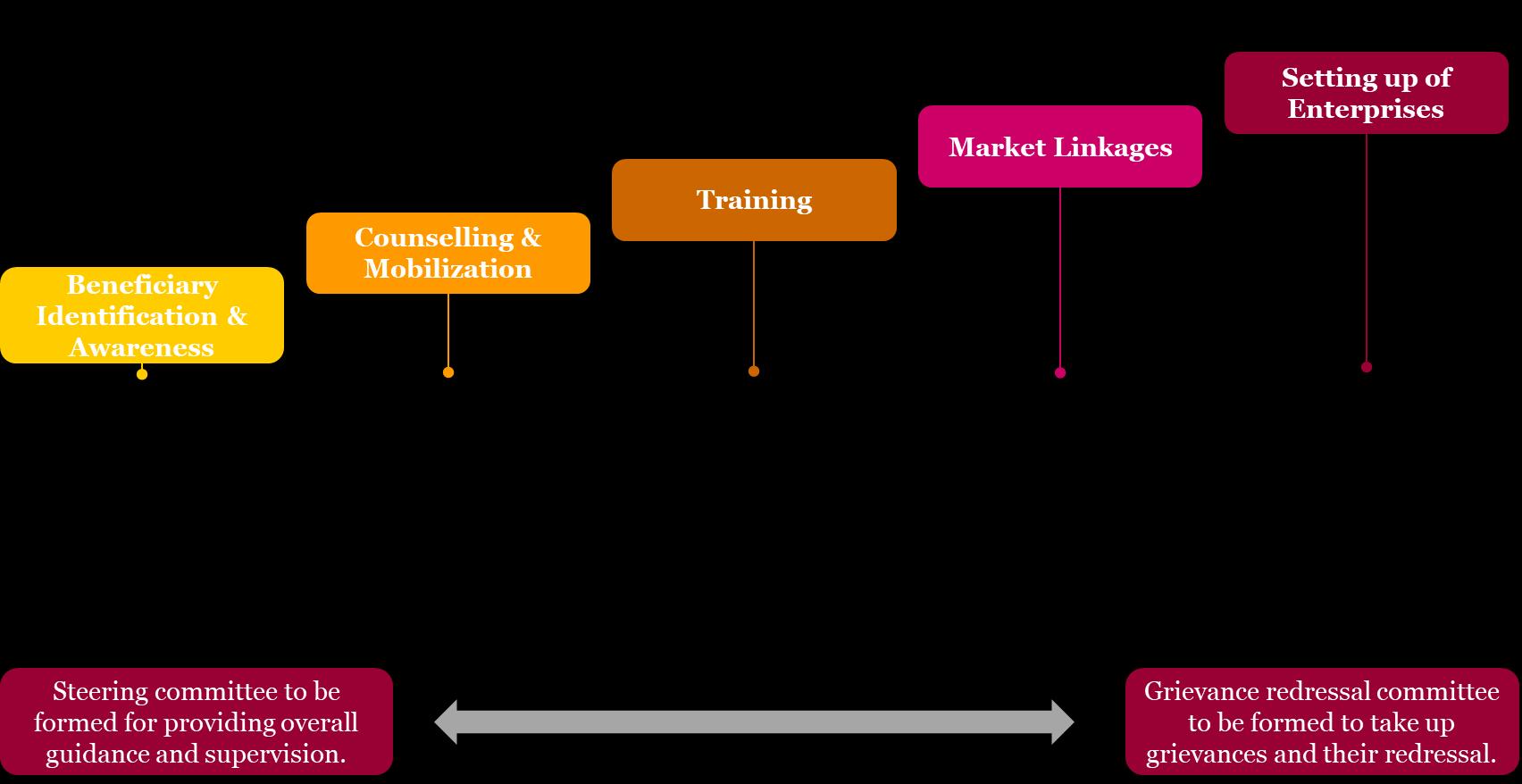
4 minute read
Table 48 Estimated cost for the above action plan
Coffee Planation Supervisor -- 60 3,00,000
Green Jobs
Advertisement
Solar Pump Technician SGJ/AGR/Q6701 120 11,76,000 Solar PV Designer SGJ/Q0111 120 17,64,000 Paper Bag Entrepreneur SGJ/Q8701 60 5,73,750 Automotive Auto Rickshaw Driver ASDC/04506 30 4,46,880
Special Projects
Exposure Visit to Vocational Institutes Livelihood Project Manager
Table 46 Estimated cost for above action plan 14 2,40,000
60 7,00,000
13.4 Special Projects
13.4.1 Career Counselling for High School Students
Career talks by the Principals / Faculties of ITIs and Polytechnic; and District Employment
Officers along with Young Professional and counsellors of Model Career Center, Koraput in selected High schools of each block covering all the blocks in the district. One-day exposure visit of selected 9th and 10th class students (of which 50% should be girls) of the High Schools to Government ITIs and Polytechnics or Short-term Skill Development
Training Centres accompanied by the HMs/Senior Teachers for learning about vocations, machines, applications of science/math, principles of designs, technology, dexterity, the world of work, etc.
Beneficiaries profile
1 High School from each block will be selected for career talk based on the student strength (Class 8th-10th), HSC result, and preferably co-educational institutions. Career talks on
‘career options after 10th ‘ will be conducted in the selected High School of the block. The
Principals of TVETs or the District Employment Officers of the district shall join as the key speaker. Powerpoint presentations, motivational videos, leaflets, etc will be used for educating students on career options. Role model the district's role models will be invited to interact with the participating high school students. Interested and willing 9th and 10th class students (50% boys + 50% girls) from these high schools shall be taken on a one-day exposure visit to the Government ITIs and Polytechnics or Short-term Skill Development Training Centres accompanied by the Headmaster or a
Senior Teacher.
Expected outcomes
Students of the high schools are informed about the career options, after passing 10th class, with knowledge of the vocational education and skill training landscape. Students are exposed to the vocations and application of theoretical knowledge in the world of work.
Monitoring Mechanisms
Bi-monthly review of progress by the District Skill Committee of the district Quarterly review by the Director of Employment and Director, Technical Education and Training Young Professional and Counsellors of Model Career Center, Koraput along with Principals of 4 Govt I.T.I.s and 1 Polytechnic will implement and monitor the project.
Implementation Plan
DSC proposed to involve the following in the implementation process: Young Professional and counsellors of Model Career Center, Koraput will monitor the implementation process. During exposure visit Principals of 4 Govt I.T.I.s and 1 Polytechnic will provide guidance.
13.4.2 Livelihood Project Manager
This project is based on the problems faced in execution of NRLM projects at the grassroots due to low literacy, banking and financial awareness among the beneficiaries etc. He suggested including a new job role in which skill trained professionals can monitor & supervise the NRLM activities from its inception to project completion. His role will be to generate awareness among the beneficiaries, prepare a DPR for financing the project, provide a linkage between banks and the beneficiaries and supervise the execution of the project as per the guidelines etc.
Beneficiaries Profile
Educated unemployed Youth Local Employment SC/ST Youth Graduate Candidates
Expected Outcome:
Selected candidates will assist in the following areas: Making of Detailed Project Report for aspiring Entrepreneurs Assist beneficiaries of various Govt. Schemes in bank proceedings Monitoring and supervising NRLM/NRUM Projects in the field Create a smooth linkage of beneficiaries and bank
Monitoring Mechanisms
Bi-monthly review of progress by the District Skill Committee of the district Quarterly review by the Director of Employment and Director, Technical Education and Training
Implementation Plan
DSC proposed to involve the following in the implementation process: Line Departments of Koraput will monitor the implementation process.
13.5 Monitoring and Evaluation
To ensure that the administration delivers its commitments both in terms of qualitative and quantitative targets, it is necessary that there is a robust monitoring and evaluation framework in place. The following are the ways and techniques to ensure the same:
a. Rating & Grading Tool
• Comprehensive, & robust evaluation mechanism for existing training infrastructure • Rating and Grading of all agencies & centres across the state on pre decided KPIs • Quantifiable parameters ensuring accurate grades • Allotment of future Short-Term Trainings targets based on Grades
b. Key Performance Indicator distribution for District officials
• Structural alignment of roles and responsibilities & KPIs for all district staffs • Monitoring based on defined roles and responsibilities
c. 360-degree Feedback Mechanism for all Stakeholder groups
• Regular collection and evaluation of feedback covering multiple stakeholder groups • All feedbacks shall be kept confidential and only be used to evaluate & improve the ongoing training infrastructure
Round the Calendar Capacity Building Initiatives at the grassroots levels
Regular capacity building and training initiatives at the village/block level across multiple domains to upgrade/ up-skill the existing workforce: Technical, Behavioral and Functional.
14 Bibliography
Aspirational District . (2020). Koraput: Skills Acquisition and Knowledge Awareness for Livelihood (SANKALP) . Authority, O. S. (2021). District Skill Development Plan.
Brief Industrial Profile of Koraput District. (2019-20). MSME- Development Institute , Cuttack. Retrieved from http://www.msmedicuttack.gov.in/
DISTRICT CENSUS HANDBOOK Koraput. (2011). DIRECTORATE OF CENSUS OPERATIONS.


